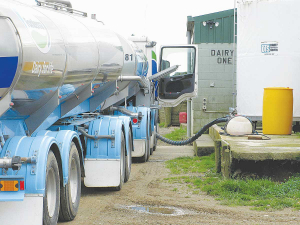Another Windfall for Fonterra Farmers, Unit Holders
Fonterra farmer shareholders and unit holders are in line for another payment in April.
 Fonterra says February saw a generally settled end to summer across the country, with cows producing more milk.
Fonterra says February saw a generally settled end to summer across the country, with cows producing more milk.
Fonterra collected more milk in February thanks to better pasture growth in most parts of the country.
The co-operative collected 136.5 million kgMS, 2.3% higher than the same month last season.
It says February saw a generally settled end to summer across the country, but with some bouts of wet and windy weather.
"Other than the far north of the North Island and Fiordland in the South Island, the whole country was sunnier than average for the time of the year.
"In regions that had rainfall with that warm weather, good pasture growth resulted."
North Island milk collection for the month reached 73.9 million kgMS, 5.9% higher than February last season. Northland experienced well above average rainfall, going some way to alleviating the very dry conditions that region had been experienced throughout summer.
South Island milk collection was 62.6 million kgMS, 1.7% behind February last season.
It says higher than average temperatures with favourable growing conditions across much of the South Island led to better than average conditions.
"While these were down on February last season, South Island collections in February 2020 were among the strongest in recent seasons."
However, in Australia the co-op's milk collection continues to dip.
It collected 7.2 million kgMS, a 5.8% decrease on February last season.
"Lower herd numbers combined with increased consumption of lower quality home-grown fodder instead of supplementary feed are continuing to impact milk production growth across Australia."
Fonterra's season-to-date collections in Australia are down 1.8% on last year.
The Meat Industry Association of New Zealand (MIA) today announced that Chief Executive Officer Sirma Karapeeva has resigned from the role.
The winners of the 2026 Hawke’s Bay/Wairarapa Dairy Industry Awards were announced at the annual awards dinner held at Copthorne Solway Park in Masterton on Thursday evening.
Environment Southland is welcoming this week’s decision by the Environmental Protection Authority (EPA) to approve the release of Blaptea elguetai, a leaf‑feeding beetle that will help control the highly invasive Chilean flame creeper.
This March, the potato industry is proudly celebrating International Women’s Day on 8 March alongside the International Year of the Woman Farmer, recognising the vital role women play across every part of the sector — from paddocks and packhouses to research, leadership, and innovation.
Fruit trader Seeka posted a record profit and returns to shareholders in 2025.
Recent weather events in the Bay of Plenty, Gisborne/Tairawhiti, and Canterbury have been declared a medium-scale adverse event.
OPINION: Staying with politics, with less than nine months to go before the general elections, there’s confusion in the Labour…
OPINION: Winston Peters' tirade against the free trade deal stitched with India may not be all political posturing by the…